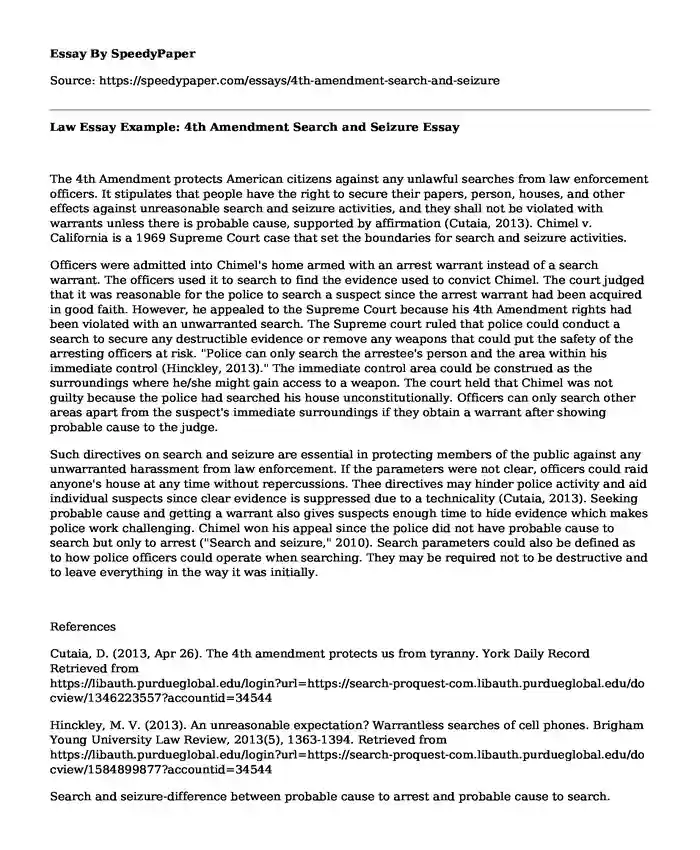
| Type of paper: | Essay |
| Categories: | Law Constitution |
| Pages: | 2 |
| Wordcount: | 471 words |
The 4th Amendment protects American citizens against any unlawful searches from law enforcement officers. It stipulates that people have the right to secure their papers, person, houses, and other effects against unreasonable search and seizure activities, and they shall not be violated with warrants unless there is probable cause, supported by affirmation (Cutaia, 2013). Chimel v. California is a 1969 Supreme Court case that set the boundaries for search and seizure activities.
Officers were admitted into Chimel's home armed with an arrest warrant instead of a search warrant. The officers used it to search to find the evidence used to convict Chimel. The court judged that it was reasonable for the police to search a suspect since the arrest warrant had been acquired in good faith. However, he appealed to the Supreme Court because his 4th Amendment rights had been violated with an unwarranted search. The Supreme court ruled that police could conduct a search to secure any destructible evidence or remove any weapons that could put the safety of the arresting officers at risk. "Police can only search the arrestee's person and the area within his immediate control (Hinckley, 2013)." The immediate control area could be construed as the surroundings where he/she might gain access to a weapon. The court held that Chimel was not guilty because the police had searched his house unconstitutionally. Officers can only search other areas apart from the suspect's immediate surroundings if they obtain a warrant after showing probable cause to the judge.
Such directives on search and seizure are essential in protecting members of the public against any unwarranted harassment from law enforcement. If the parameters were not clear, officers could raid anyone's house at any time without repercussions. Thee directives may hinder police activity and aid individual suspects since clear evidence is suppressed due to a technicality (Cutaia, 2013). Seeking probable cause and getting a warrant also gives suspects enough time to hide evidence which makes police work challenging. Chimel won his appeal since the police did not have probable cause to search but only to arrest ("Search and seizure," 2010). Search parameters could also be defined as to how police officers could operate when searching. They may be required not to be destructive and to leave everything in the way it was initially.
References
Cutaia, D. (2013, Apr 26). The 4th amendment protects us from tyranny. York Daily Record Retrieved from https://libauth.purdueglobal.edu/login?url=https://search-proquest-com.libauth.purdueglobal.edu/docview/1346223557?accountid=34544
Hinckley, M. V. (2013). An unreasonable expectation? Warrantless searches of cell phones. Brigham Young University Law Review, 2013(5), 1363-1394. Retrieved from https://libauth.purdueglobal.edu/login?url=https://search-proquest-com.libauth.purdueglobal.edu/docview/1584899877?accountid=34544
Search and seizure-difference between probable cause to arrest and probable cause to search. (2010). Criminal Law Reporter, 86(16), 482. Retrieved from https://libauth.purdueglobal.edu/login?url=https://search-proquest-com.libauth.purdueglobal.edu/docview/209292997?accountid=34544
Cite this page
Law Essay Example: 4th Amendment Search and Seizure. (2022, Jul 28). Retrieved from https://speedypaper.com/essays/4th-amendment-search-and-seizure
Request Removal
If you are the original author of this essay and no longer wish to have it published on the SpeedyPaper website, please click below to request its removal:
- Essay Sample with a Prediction Regarding the Future of the Global Economy
- Free Essay on Core Competencies of Administrator
- Free Essay Sample on Selling Luxury on the Web
- American History Essay Example: Illinois Territory, Non-importation Act
- Essay Sample with Social Media Proposal
- Essay Sample: Why Animal life Matters
- Free Essay Example - Auguste Renoir
Popular categories




